Lords of Waterdeep is one of our favorite board games here on Assorted Meeples and we play it both in person as well as using the online version to play one another via Steam. Combining the best of worker placement European-style boardgames with intense strategy and a bit of deck building (hello Intrigue Cards), this is a game that is loved not only by fans of Fantasy adventure novels but also board game enthusiasts who love an incredibly fun and challenging well-put together game.
In fact if we take too long to make a decision on what game to play, as long as we’re not all completely mentally burned out, Lords of Waterdeep it is! There’s so much nuance to learn about this game, and the shifting of lords, buildings, and available quests or cards means the game is always fresh and a good play.
One major thing you need to learn about fast is the importance of good Plot Quests. These are quests that are generally worth less points than you would expect, but they give you some type of bonus that you can take advantage of throughout the rest of the game.
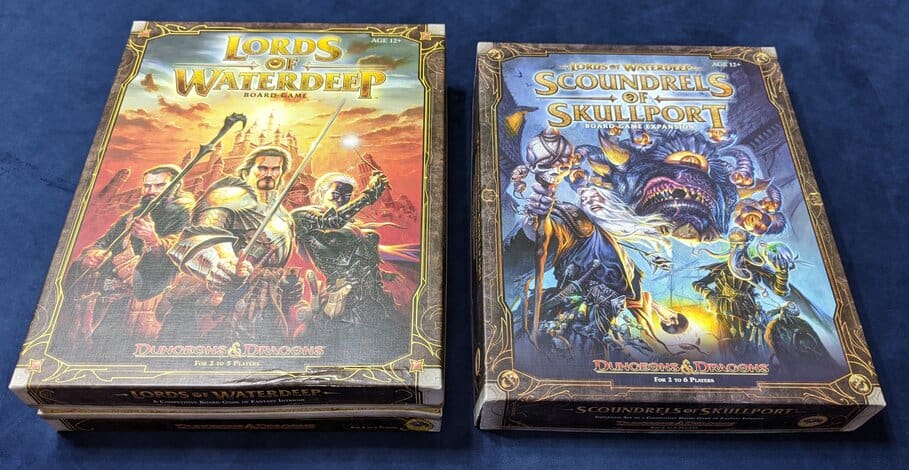
Best Lords of Waterdeep Plot Quests
Note: This list includes both expansions as the overwhelming majority of players now always play with both expansions in play (including our tables here at Assorted Meeples). Many of the plot quests on here are from the expansions, and the list will change dramatically if one or both of the expansions are taken out of the equation.
Honorable Mentions: Defame Rival Business, Extort Aurora, Produce a Miracle for the Masses & Impersonate Tax Collector
This will cause some controversy, and in fairness I can see why as some of these are absolutely interchangeable with the bottom three picks on this list. But generally speaking honorable mentions are very powerful in very specific circumstances while the top ten plot quests are basically useful in almost any game or situation. Some of these can change based on how the board plays out, but this is something you’ll learn playing over time.
#10: Diplomatic Mission to Suzerain
Type: Piety Plot Quest
Benefit: Allows you to complete quests that are still showing in Cliffwatch Inn as long as you have the right pieces & gold to do so. This allows you to finish quests that are showing that aren’t in your hand.
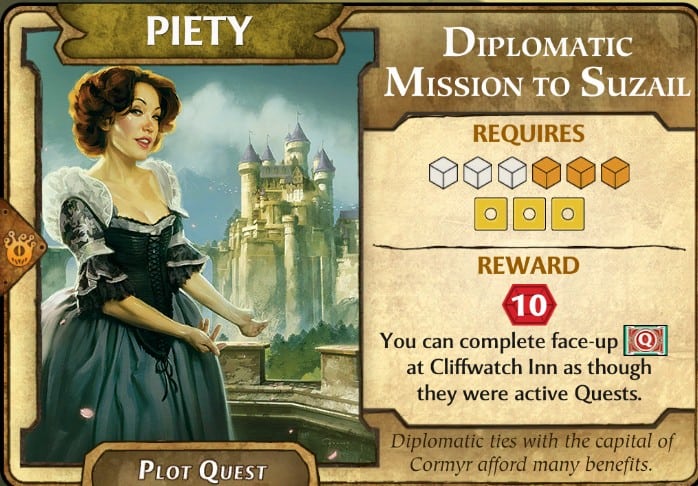
This is one of those plot quests that often gets overlooked because it is a bit costly, and the benefit is powerful but not necessarily guaranteed. However, players who get this done early almost always end up stealing easy points at the end of the game, get extra resources from not having to spend time grabbing quests, and can even stop other players from blocking them out.
This can be a very powerful quest. Have a quest you really want showing but all the spaces to grab a quest have a meeple on them? No problem – just get the pieces and gold to finish it and you can grab it from the top.
Did someone cut you off from being able to grab a powerful bonus quest? You don’t need to wait until the next turn, just finish it.
Do you see a quest that someone clearly wants but you really need to grab a different space to get some badly needed pieces or gold for yourself? You can still grab those resources and then just complete the quest to pull off the ultimate block.
This is a strong quest that gives you flexibility – something that’s important whether the board is resource rich or resource poor. While not overpowering as some others on this list, it’s an excellent plot quest most other players will end up forgetting about until its use bites them in the butt. At 10 points it’s one of the better scoring plot quests, as well, and counts for Trobriand’s bonus.
#9: Recruit Lieutenant
Type: Warfare Plot Quest
Benefit: You acquire an extra meeple you get to use for the rest of the game.

Undeniably a powerful plot quest, the placement so low on this list is going to cause a lot of controversy. So maybe this statement will to: I had to be talked into putting this on the list over some of the honorable mentions.
Is the Lieutenant potentially a game changer? Sure.
But there are also several reasons why it’s also arguably the most overrated plot quest in all of Lords of Waterdeep.
First take a look at the cost. While an extra meeple is powerful, investing 8 pieces for zero points is a pretty steep price. Especially considering you need a cleric and wizard with that. If you hit Slaver’s Market, Field of Triumph, and Skull Island on turn one of a game and then get lucky enough to get one more warrior from some intrigue card then sure, this is far more likely to pay off.
Especially in a resource rich game where there are many buildings providing a ton of pieces. That extra meeple can then easily make up that 8 point investment. However, if you get blocked out from completing it for a round or two or you lose out on a lot of value. Another way to look at it: if you use four meeples to gather the resources to get this card, that takes four rounds of a Lieutenant to make up for those used meeple actions.
Look this doesn’t mean that Recruit the Lieutenant is trash. When other players have three meeples and you have four, that extra one is huge. Especially in the early game. When other players have four and you have five, that extra piece isn’t quite as valuable but it’s still a big deal. This is a strong plot quest, but you MUST get it early to be worth it.
Getting this plot quest in the first three rounds makes it a strong card. Getting it round five or later means there’s a good chance you won’t make your piece investment back. Get it early or avoid it like the plague.
#8: Study in the Librarium
Type: Arcana Plot Quest
Benefit: Every time you play an intrigue card you may draw another intrigue card from the deck and play it immediately.
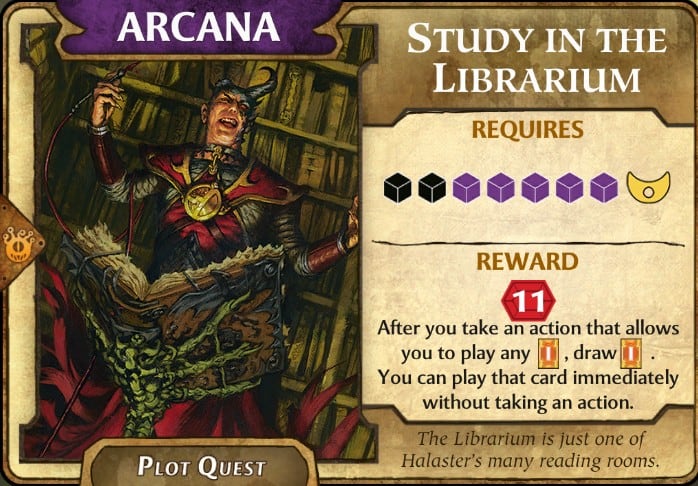
This is an incredibly powerful plot quest that, from the pure power standpoint, could easily be in the top three on the list. On an ideal game where you get Skull Island on turn one, an intrigue card that gives wizards, and a building that gives wizards, this moves all the way up towards the top. It may even compete for #1 at that point during the rare times you nail this on turn one.
For most other situations the cost is high. Five wizards, two rogues, and five gold is a lot to ask for just 11 points.
Intrigue cards provide many cards that give gold, many cards that give free pieces. You get the ability to get rid of corruption, hamper your opponents with mandatory quests, and even buy or acquire buildings.
If you have a steady stream of intrigue cards coming in, the ability to play twice as many is incredibly strong. The earlier you get it, the better, but this still works well in mid-game. Obviously the later in the game the less likely you are to make up the difference, especially since wizards are generally a high demand and low available resource.
The effects when this is in full power is devastating. In one game we watched Braden use this and the extra cards played allowed him to get rid of 5 corruption, claim an extra 12 pieces, 10 gold, take over a valuable building, trade out a crap building of his for a strong building we all used, and hammered us with an insane 7 mandatory quests.
Needless to say, this card allowed him not only to win, but among our group it was one of the rare “won handily” games.
The downside: this is a very expensive quest in terms of high demand pieces so if you don’t have any wizard generating intrigue cards or a wizard generating building early on, it’s hard to get this done fast.
#7: Protect Converts to Eilistraee
Type: Piety Plot Quest
Benefit: Every time you take an action to get rid of a corruption, get rid of another corruption
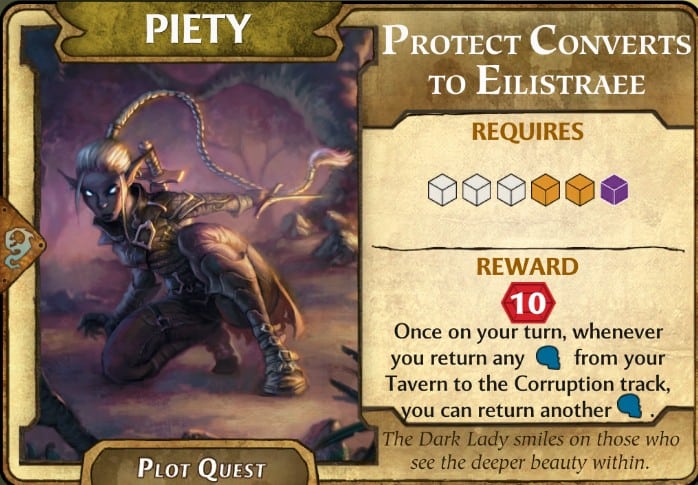
In high corruption games this one is a game changer, and it’s one of Shane’s absolute favorites when playing Lords of Waterdeep. Many times the best spaces give more resources but at the penalty of corruption. This makes buildings that get rid of corruption very popular to use and quests that get rid of corruption can cause a shark frenzy among players looking to grab them.
This bonus works on all of those. Instead of returning one corruption after using a building, return two. Instead of returning three corruption to the track, return four.
That is getting rid of end of game penalties for free, while also letting you play more loose and aggressive with spots like Skull Island or The Slavers Markets that give a lot of pieces but make you take a corruption as a balance.
This is a bit expensive for a plot quest, but it does give 10 points which is high for a plot quest, it counts as bonus for many different Lords (Piety lords, Sangalore, Trobriand, Danilo), and returning corruption is directly adding points to your final score. Four extra corruption returned in a high corruption end game could be 28 or 32 points of penalties you avoid. Very few quests give you that value.
This does demand multiple high level pieces and the quests, intrigue cards, or available buildings to use it, but there will almost always be some of those available in the course of a game. In the right scenarios, this is a game changer.
#6: Bribe the Shipwright/Fence Goods for the Dark Lord
Type: Commerce & Skullduggery Plot Quests
Benefit: Bribe the Shipwright gives you a free rogue every time you pick up gold. Fence Goods for the Dark Lord gives you free gold every time you pick up a rogue
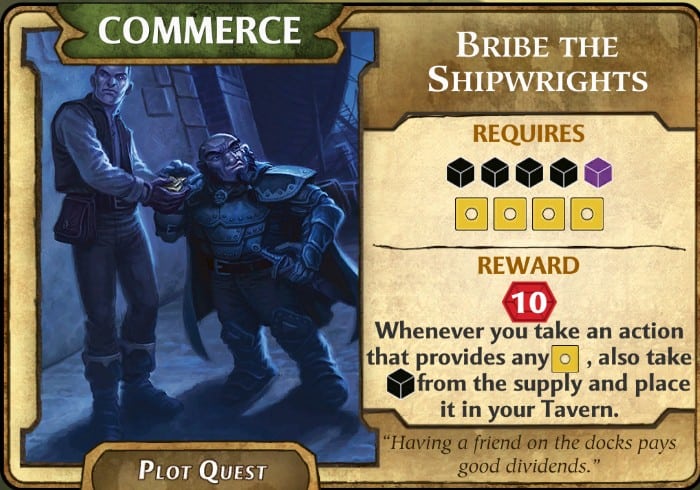
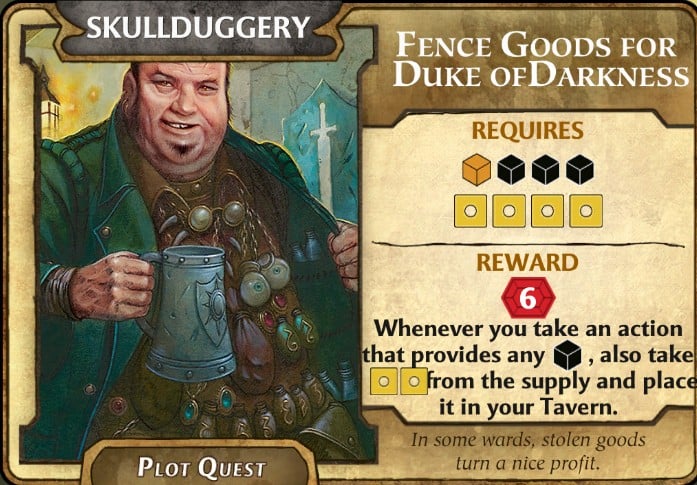
Okay this is a bit of a cheat. Each of these individually will generally still be strong enough to reach Honorable Mention level, and together they are often game-breakingly devastating. Anyone in our group who gets one looks for the other regardless of who their lord is or what the strategy is. Gold is always important regardless of lord, and rogues are common for many quest types.
The ability to get free rogues every time you take any action that gives gold (using a building, using a spot with gold on it, even playing an intrigue card that gives you gold) is extremely strong. If you need a lot of rogues this opens up how many you get. If you only need the occasional one, now you get them while gathering gold and you don’t need to waste Meeples on getting that occasional random piece.
The ability to get gold is important in around 14/15 games. Occasionally you get that rare board absolutely flooded with cash, but most of the time gold is at a premium. Opening up extra spaces that give you gold but no one else (potentially four spaces just from places on the board and expansion – not even including purchased buildings).
These are strong plot quests individually that are almost always useful in some capacity no matter the game or lord. When put together, they are always valuable. Always. But because we are asking you to pick up two, that’s a lot of investment early on even though rogues tend to be available early on.
Not to mention, how freaking OP do these three buildings get if you have both of those plot quests?
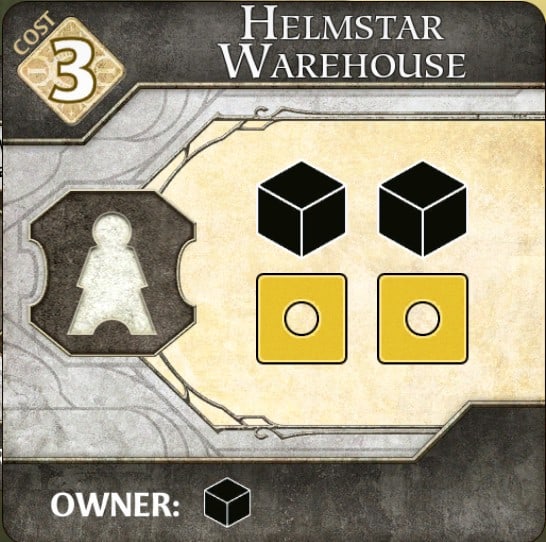
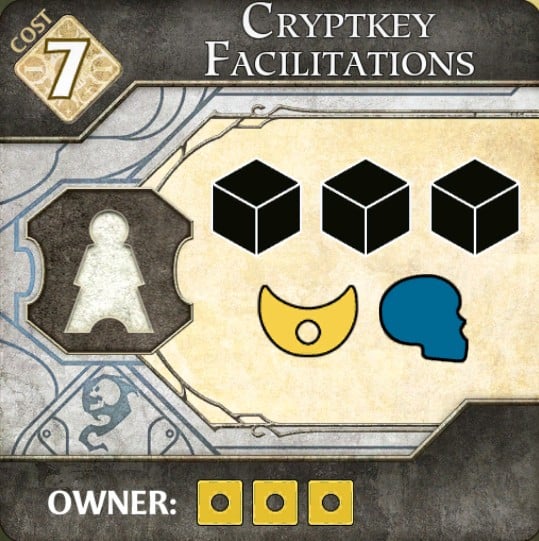
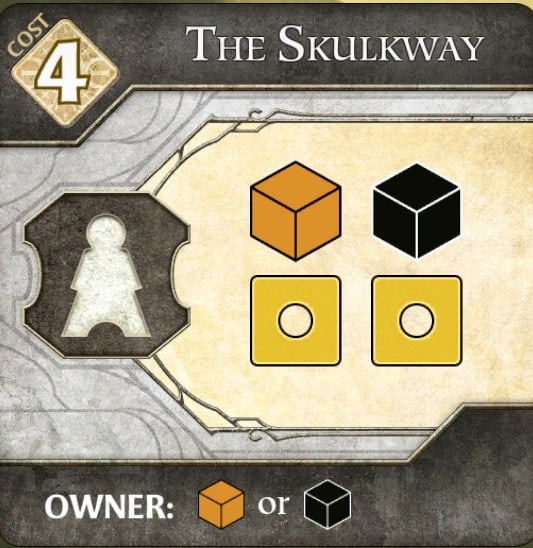
#5: Defend the Tower of Luck
Type: Piety Plot Quest
Benefit: One piece of your choice upon completion and one piece of your choice at the beginning of every single round.
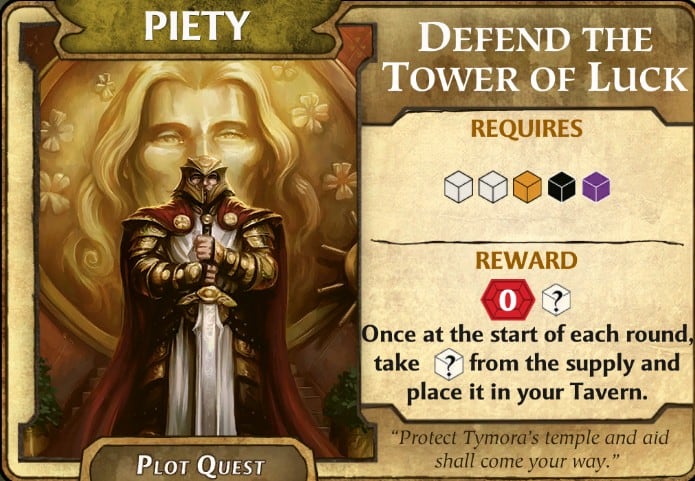
Confession time: I am very guilty of overlooking this quest a lot during my playing time. Obviously this is a quest whose benefit is bigger the earlier you get it. The zero points has turned me off from this quest in the past, but the more I look at it and see how it can have a ripple effect, the more I’m becoming a huge fan.
This is an incredible plot quest if you can complete it in the first three rounds. After that…it gets much more iffy unless you have a board with some serious limitations like a lack of extra wizards, clerics, or if you have three players all fighting over the same unit types.
If you have this round one, it should only take three meeples to complete, at which point you not only get to take a wizard or cleric back, but you also also get that free unit when a round begins.
Most of the time that means a free cleric and wizard. Not even an “extra” one which still requires a specific action with your limited Meeples, but you get a free piece, period. If you finish this round one that means 7 free clerics and/or wizards throughout the game which is super powerful in and of itself.
What I overlooked: how this could change strategy.
For Example: All the spots to grab a quest off of Cliffwatch Inn are taken as players go through the Harbor. You’re going first next round. You really need that quest, but you really need to grab a spot on a high value building. If you grab the pieces from the building you will lose that quest because another player will grab it. Grab the quest, there’s no way you get those high value pieces at the spot everyone wants. You have a Piety quest in your hand that allows you to grab another quest upon completion, but you’re one piece short.
This plot quest saves you in that situation. While other players are planning around you having to do one or the other, you use the plot ques at the beginning of the round to take the unit you need, take the valuable building spot to get more units, and then complete the Piety quest that lets you grab that quest you need from Cliffwatch as a reward.
Instead of either or, that one piece allowed you to do both with one meeple.
These situations come up surprisingly often in the game. This plot quest also makes it hard to choke out a player by cutting off a piece type since free reinforcements are coming anyway.
At a certain point this plot quest might not be worth it, like round five, but most plot quests aren’t worth it at that point. This is an underrated plot quest that flies under the radar and tends to punch way above its noticeable weight.

#4: Explore Ahghairon’s Tower
Type: Arcana Plot Quest
Benefit: Draw an intrigue card every time you take an action that provides you with a wizard
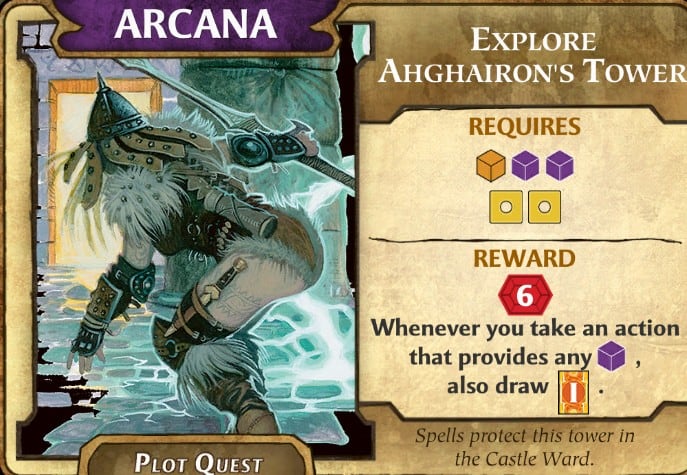
Yeah, this might be a touch high depending on what type of intrigue cards you draw, and if another player plays the intrigue game, cutting off the spaces where you can then play those cards, but in most games this is going to be an incredibly powerful plot quest.
This is a plot quest that doesn’t take very many resources to complete, which is a definite plus. That gets it working for you early.
On top of that, intrigue cards can be powerful, especially if you can get enough to make sure you get some of the most useful ones. Getting an extra intrigue card with every action that results in a wizard gives you those extra cards and opens up Waterdeep Harbor for your meeples, allowing them to take an extra turn.
Extra resources/movements for every meeple on the board is a good way to make sure you win even the most competitive games.
This also gives you the ammunition to use buildings that allow you to gather money or pieces but only if you can play an intrigue card. It also makes the building allowing you to play three in one turn devastating if you’ve managed to wrack up a dozen or more of the good ones.
Just from the played intrigue cards this means extra pieces, the ability to dump corruption, extra gold, mandatory quests to bog down your opponents, victory points, or even burying them in extra corruption if you are playing a low corruption game. Those are huge benefits that can give you incredible advantages and that’s even before diving into more specialized intrigue cards or looking at all the extra turns your Meeples on Waterdeep Harbor get to take at the end of each round and what those movements resulted in.
Because of the low investment and how powerful the right intrigue cards can be, this is one of the rare plot quests that can still be powerful in later rounds, as well, which is a big part of why it’s coming in at #4. I love seeing this plot quest on the board…unless someone else gets a hold of it.
#3: Bolster Griffon Cavalry
Type: Warfare Plot Quest
Benefit: Every time you take an action that gives you a warrior, take another warrior.
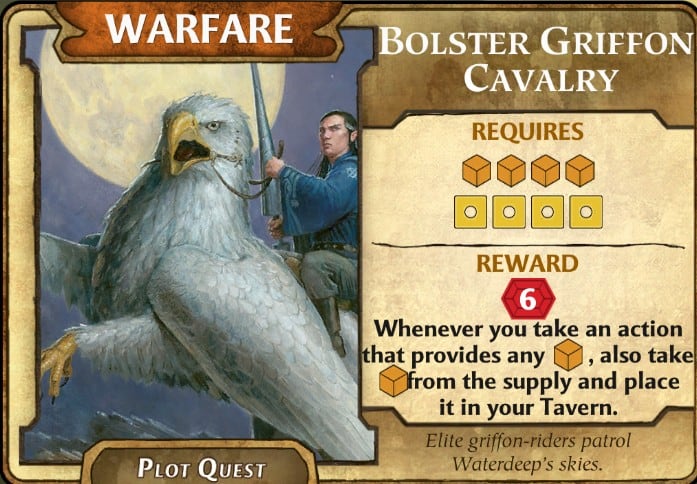
I always knew this was a solid plot quest, but it often fell to the wayside enough times that it just ended up being undone or not done until near the end of the game when I was just looking for all the points I could get.
That was a mistake. The number of times that extra warrior comes up is incredible. Field of Triumph is obvious but with the expansions The Slaver’s Market is a high value spot – which with this plot quest gives you yet another warrior.
So can any building that gives a warrior, or allows you to choose a piece and you pick a warrior. Warriors are big for Warfare quests but also for Piety, and Commerce, as well. Many major Arcana and Skullduggery quests require a few warriors on the side.
Since this action works every time it’s not out of the question to get 3-4 extra warriors in a single round just from grabbing your normal spaces. Add in some cards at Waterdeep Harbor that give you warriors, and that number even goes up.
This is a plot quest that if done in round one, can easily yield over a dozen warriors in a game, and in fact will often provide around 20 for most players. That’s an INSANE amount of value from a plot quest and opens up options you may not have considered. There’s nothing like watching the faces at the table when, as an Arcana or Piety lord you have so many warriors you can just pick up a 40 point Warfare quest and complete it from pieces you have just laying around.
This is an incredible plot quest and always one of the strongest in the game early on whether the board is piece-rich or piece-poor.
#2: Recover the Magister’s Orb
Type: Arcana Plot Quest
Benefit: Once per round you may use a space that any other player has already placed a meeple at.
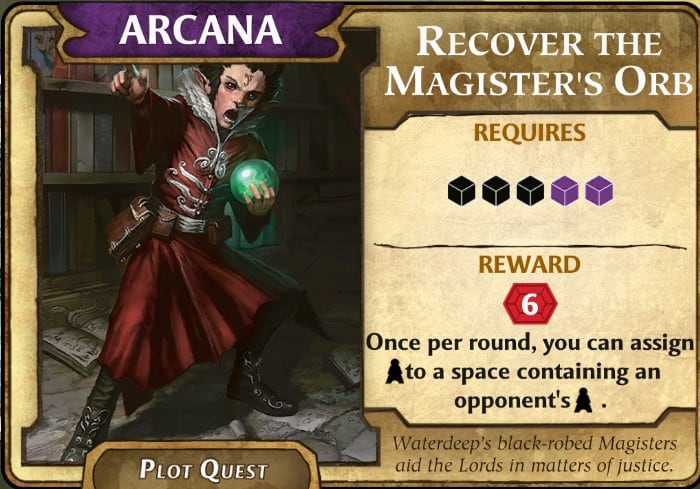
This is one of my favorite plot quests out there, though it’s powerful for a different reason than most of the others that are on this list. Recover the Magister’s Orb is an Arcana plot quest that allows you once a round to use a space that already has someone else’s meeple on it.
This is NOT blockable by Open Lord since this is not an attack card, which gives you insane flexibility. Whether dumping corruption using buildings others already have used before you, or having to get those last few pieces from a building others raced to use early on.
If you want to be clever, you can even sneak one in on a full Waterdeep Harbor. Yes, that does allow you to use that meeple during the harbor phase (though after the player you’re sharing the space with).
This freedom of movement allows you to grab resources that are off limits to others, never get blocked from Builder’s Hall as the Builder, or to clear Cliffwatch Inn of powerful quests you don’t want anyone getting their hands on. You can snipe, frustrate, collect sparse resources on a starved board, and keep your war machine going.
There are few plot quests that offer this level of versatility. Even more impressive is that this is always useful. On a board flush with available pieces it’s one of the most useful plot quests. On a board starved of pieces it is one of the most useful plot quests. Same with a cash starved board. Need to dump corruption on a dumpster fire of a board but someone beat you to the only building available? Doesn’t matter.
This is a plot quest that is always useful and has even made the difference in the game after a very late round pickup.
#1: Seize the Citadel of the Bloody Hand
Type: Warfare Plot Quest
Benefit: Every time you complete a quest, return one of the pieces used to your tavern
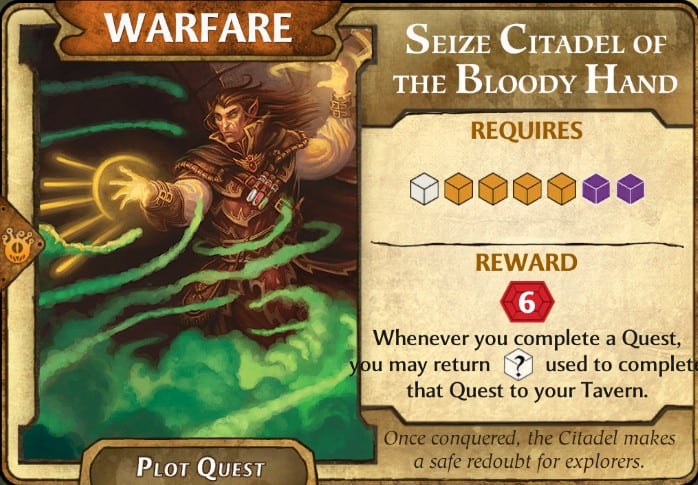
Honestly, I feel like there are good arguments for #1 and #2 being almost interchangeable. Almost.
The point is both are always solid picks fairly late into the game. Sometimes in the right situation even in very late rounds.
However, if you grab Seize the Citadel of the Bloody Hand this is devastating to other players. The ability to claim one piece back from every mission (almost always a wizard or cleric) or every completed quest (including mandatory quests) means in a three player long game you’re probably getting 12-15 pieces. Sometimes more.
Considering all of these could be wizards and clerics, if need be, that is amazing. The ability to recycle a needed wizard or cleric over and over again on a starved board is an amazing leg up on others.
These also mitigate some of the damage from Mandatory Quests because, yes, this applies to those, too. While you still have the “wasted” turn, if you finish a Mandatory Quest you still get to take one of those pieces back.
This also means that whatever your Lord is, this plot quest will help you get the most important or hardest to grab pieces that come up most often with your quests. The more quests you get done, the stronger this card is. If you can get it by early round two or three, it is incredible. There was one game I started with this and thanks to a couple good intrigue cards, I had this finished round one with two meeples on Waterdeep Harbor. That game was nothing short of a slaughter, as this plot quest ended up being worth 18 pieces to me that game.
Mostly wizards and clerics, but with a few rogues when those turned out to be hard to pickup because of corruption dumps on the board. How can you compete with that? This is the strongest plot quest, and is still useful until around round five. After that it’s harder to justify, but because of those extra late round meeples, it can still be worth picking up that late in the game.
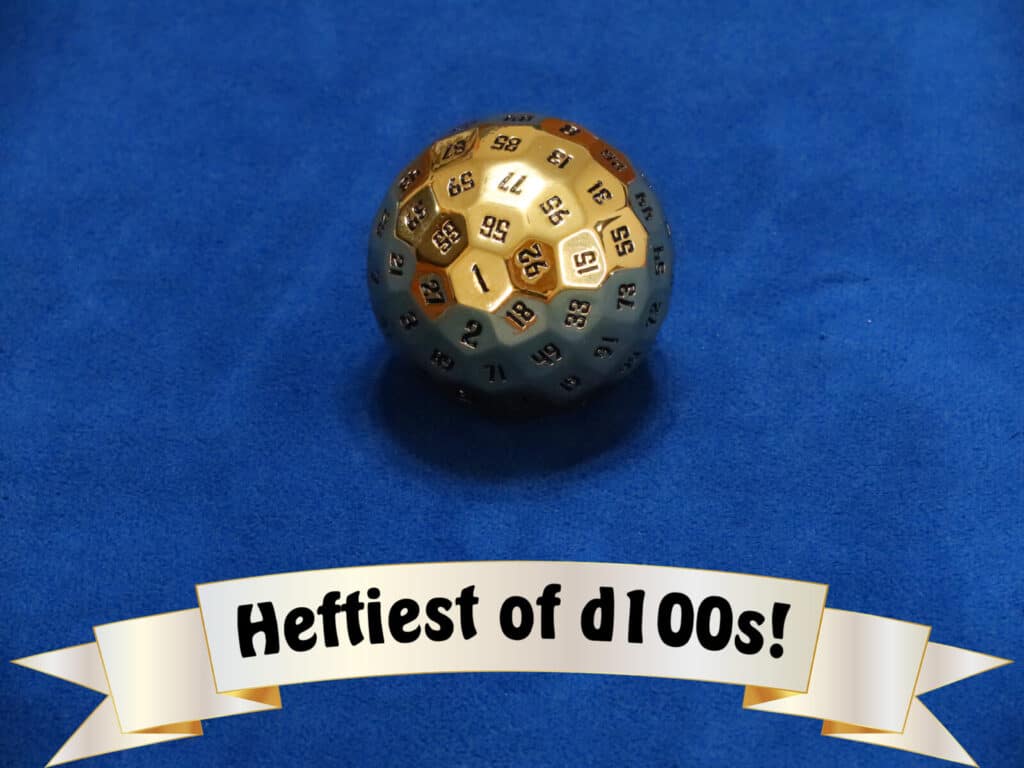
In Conclusion
There are situational plot quests that are strong and to some extent you have to play the hand you are dealt or the plot quests that are available. That said, it’s funny to me how often some of these are strongly underrated as good plot quests while others get overvalued and chased – sometimes making a situation where a good plot quest actually becomes a player’s undoing.
These are consistently the best plot quests in Lords of Waterdeep and especially for those high on this list, you should look at grabbing them in the early rounds no matter who your lord is. Stack up the right powerful boosts early and you will steamroll your competition in later rounds.
You’ll Love These Lords of Waterdeep Resources!
- The Ultimate Lords of Waterdeep Lord Strategy Guide
- Lords of Waterdeep: Assorted Meeples Long Play Games
- Unqualified Experts YouTube Show: Best & Worst Lords of Waterdeep
Other Board Game Articles You May Love

Proud to embrace the locally created moniker of “Corrupt Overlord” from one of the all time great Lords of Waterdeep runs, Shane is one member of the Assorted Meeples crew and will be hard at work creating awesome content for the website. He is a long-time player of board games, one time semi-professional poker player, and tends to run to the quirky or RPG side of things when it comes to playing video games. He loves tabletop roleplaying systems like Dungeons & Dragons, Pathfinder, Werewolf, Fate, and others, and not only has been a player but has run games as DM for years. You can find his other work in publications like Level Skip or Hobby Lark.
